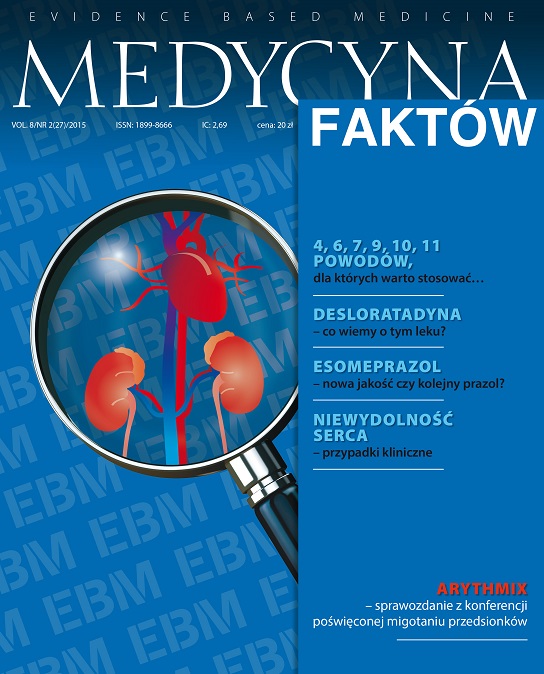10 powodów, dla których warto stosować akarbozę Artykuł przeglądowy
##plugins.themes.bootstrap3.article.main##
Abstrakt
Akarboza hamuje α-glukozydazę. Może być stosowana razem z innymi lekami przeciwcukrzycowymi już na 2. etapie leczenia cukrzycy. Obniża glikemię poposiłkową, glikemię na czczo, wyrównuje dobowy profil glikemii, nie ma wpływu na wagę ciała, w monoterapii nie powoduje hipoglikemii. Ze względu na miejscowy mechanizm działania jest bezpieczna, nie powoduje poważnych działań niepożądanych.
##plugins.themes.bootstrap3.article.details##
Jak cytować
Duda-Król, W. B. (2015). 10 powodów, dla których warto stosować akarbozę . Medycyna Faktów , 8(2(27), 49-52. Pobrano z https://journalsmededu.pl/index.php/jebm/article/view/2311
Numer
Dział
Artykuły
Copyright © by Medical Education. All rights reserved.
Bibliografia
1. Zalecenia kliniczne dotyczące postępowania u chorych na cukrzycę 2015. Diabetologia Kliniczna 2015; 4(supl. A).
2. IDF DIABETES ATLAS Sixth edition.
3. Cukrzyca – ukryta pandemia.
4. Sieradzki J.: Cukrzyca – kompendium. Via Medica, Gdańsk 2009: 171-180.
5. Sieradzki J.: Miejsce akarbozy w schematach leczenia cukrzycy typu 2 – komentarz. Diabetologia Praktyczna 2009; 10(2): 81-83.
6. Holman R.R., Cull C.A., Turner R.C.: A randomized double-blind trial of acarbose in type 2 diabetes shows improved glycemic control over 3 years (U.K. Prospective Diabetes Study 44). Diabetes Care 1999; 22: 960-964.
7. Sieradzki J.: Leki blokujące alfa-glukozydazę (farmakologia kliniczna oraz charakterystyka poszczególnych preparatów). W: Farmakoterapia w cukrzycy. Grzeszczak W. (red.). Via Medica, Gdańsk 2007: 80-92.
8. Sieradzki J.: Efekt inkretynowy akarbozy. Diabetologia Praktyczna 2010; 11(3): 80-83.
9. Seifarth C., Bergmann J., Holst J.J. et al.: Prolonged and enhanced secretion of glucagon-like-peptide (7-36 amide) after oral inhibition (acarbose) in type 2 diabetic patients. Diabetic Med. 1998; 15: 485-491.
10. Charakterystyka produktu leczniczego Glucobay 100.
11. Chiasson J.L.: Acarbose for prevention of type 2 diabetes mellitus: the STOP-NIDDM randomised trial. The Lancet 2002; 359: 2072-2077.
12. Van de Laar F.A., Lucassen P.L., Akkermans R.P. et al.: Alpha-glucosidase inhibitors for patients with type 2 diabetes: results from a Cochrane systematic review and meta-analysis. Diabetes Care 2005; 28: 166-175.
13. Hanefeld M.: Cardiovascular benefits and safety profile of acarbose therapy in prediabetes and established type 2 diabetes. Cardiovasc. Diabetol. 2007; 6: 20.
14. Rosenthal J.H., Mauersberger H.: Effects on blood pressure of the glucosidase inhibitor acarbose compared with the insulin enhancer glibenclamide in patients with hypertension and type 2 diabetes mellitus. Clinical Drug Investigation 2002; 22: 695-670.
15. Oyama T., Saiki A., Endoh K. et al.: Effect of acarbose, an alpha-glucosidase inhibitor, on serum lipoprotein lipase mass levels and common carotid artery intima-media thickness in type 2 diabetes mellitus treated by sulfonylurea. J. Atheroscler. Thromb. 2008; 15: 154-159.
16. Hanefeld M., Cagatay M., Petrowitsch T. et al.: Acarbose reduces the risk for myocardial infarction in type 2 diabetic patients: meta-analysis of seven long-term studies. Eur. Heart J. 2004; 25: 10-16.
17. Wolever T.M., Chiasson J.L., Josse R.G. et al.: Small weight loss on long-term acarbose therapy with no change in dietary pattern or nutrient intake of individuals with non-insulin-dependent diabetes. Int. J. Obes. Relat. Metab. Disord. 1997; 21(9): 756-763.
2. IDF DIABETES ATLAS Sixth edition.
3. Cukrzyca – ukryta pandemia.
4. Sieradzki J.: Cukrzyca – kompendium. Via Medica, Gdańsk 2009: 171-180.
5. Sieradzki J.: Miejsce akarbozy w schematach leczenia cukrzycy typu 2 – komentarz. Diabetologia Praktyczna 2009; 10(2): 81-83.
6. Holman R.R., Cull C.A., Turner R.C.: A randomized double-blind trial of acarbose in type 2 diabetes shows improved glycemic control over 3 years (U.K. Prospective Diabetes Study 44). Diabetes Care 1999; 22: 960-964.
7. Sieradzki J.: Leki blokujące alfa-glukozydazę (farmakologia kliniczna oraz charakterystyka poszczególnych preparatów). W: Farmakoterapia w cukrzycy. Grzeszczak W. (red.). Via Medica, Gdańsk 2007: 80-92.
8. Sieradzki J.: Efekt inkretynowy akarbozy. Diabetologia Praktyczna 2010; 11(3): 80-83.
9. Seifarth C., Bergmann J., Holst J.J. et al.: Prolonged and enhanced secretion of glucagon-like-peptide (7-36 amide) after oral inhibition (acarbose) in type 2 diabetic patients. Diabetic Med. 1998; 15: 485-491.
10. Charakterystyka produktu leczniczego Glucobay 100.
11. Chiasson J.L.: Acarbose for prevention of type 2 diabetes mellitus: the STOP-NIDDM randomised trial. The Lancet 2002; 359: 2072-2077.
12. Van de Laar F.A., Lucassen P.L., Akkermans R.P. et al.: Alpha-glucosidase inhibitors for patients with type 2 diabetes: results from a Cochrane systematic review and meta-analysis. Diabetes Care 2005; 28: 166-175.
13. Hanefeld M.: Cardiovascular benefits and safety profile of acarbose therapy in prediabetes and established type 2 diabetes. Cardiovasc. Diabetol. 2007; 6: 20.
14. Rosenthal J.H., Mauersberger H.: Effects on blood pressure of the glucosidase inhibitor acarbose compared with the insulin enhancer glibenclamide in patients with hypertension and type 2 diabetes mellitus. Clinical Drug Investigation 2002; 22: 695-670.
15. Oyama T., Saiki A., Endoh K. et al.: Effect of acarbose, an alpha-glucosidase inhibitor, on serum lipoprotein lipase mass levels and common carotid artery intima-media thickness in type 2 diabetes mellitus treated by sulfonylurea. J. Atheroscler. Thromb. 2008; 15: 154-159.
16. Hanefeld M., Cagatay M., Petrowitsch T. et al.: Acarbose reduces the risk for myocardial infarction in type 2 diabetic patients: meta-analysis of seven long-term studies. Eur. Heart J. 2004; 25: 10-16.
17. Wolever T.M., Chiasson J.L., Josse R.G. et al.: Small weight loss on long-term acarbose therapy with no change in dietary pattern or nutrient intake of individuals with non-insulin-dependent diabetes. Int. J. Obes. Relat. Metab. Disord. 1997; 21(9): 756-763.
